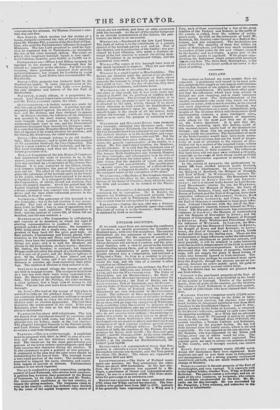ENGLISH COUNTIES.
If we could reject from our estimate the costliness of elections, we should pronounce the Counties of England open, with very few exceptions. The smaller freeholders are too numerous to be controlled by great proprietors. But the expense of county elec- tions has excluded the competition of gentlemen whose fortunes will not bear a contest, and the prin- cipal families, with a view to preserve the friendly understanding among them, and at the same time to prevent the outbalancing of party interests, have usually entered into a compromise, and returned a Whig and a Tory. So long as a member is not per- sonally obnoxious to the freeholders, he is suffereato retain his seat, and the idea of a contest is often scouted as an illiberal act.
The great county patrons are, perhaps, the Earl of Lousdale, who influences one return for CUMBER- LAND, and two for WESTMORELAND. The Duke of Devonshire, one for Deem/six' ne ; the Duke of Beaufort, one for 1VONMOUTIISEIIRE and another for GLOUCESTERSHIRE ; the Earl of Derby, one for LANCASHIRE; Earl of Egremont, one for SUSSEX ; and the Duke of Buckingham, one for Bu ceixo 11.431- simian. The Duke of Rutland and the Duke of Manchester are very influential in HUNTINGDON- SHIRE. The influence of these personages is often maintained by the mere absence of objection to them- selves or their near relatives whom they putt forward. In no case, with pethaps the exception of Westmore- land, could they carry the election in defiance of the independent freeholders, who are not their tenants. There is a large class of freeholders in every county n-ho do not exercise their suffrage ; the gathering to- gether of a county in one place causes so much ex- pense, which many freeholders who would give an unbiassed vote are unable to afford, and the tumult and debauchery of such election contests present scenes which few would willingly witness- At the general election of 1826, the expenses of Mr. Palmer, the late member for Sorry, were 15,000/. ; Mr. Dennison paid 10,000/. ; and Mr. Stunner, 8,0001. At the same election, Mr. M'Queen the member for Bedfordshire, paid 18,000/. ; at the election for Northumberland, Air. Liddell paid 32,0e01.
Ds ILBYSIIIRE.—A correspondent states that Der- byshire is ,virtually a c lose borough. The Duka of Devonshire returns one member, and the Tory gentry the other, (Mr. Manly). The voters are supposed to be between 3000 and 4000.
Leicesaansuras.—The Duke of Rutland nomi- nates one member, the Tory aristocracy the other. There are about 6000 freeholders. At the last elec- tion, the Duke's nominee was opposed by a Mr. Paget, a gentleman of liberal and independent prin- ciples ; he was in a minority of 800. The Duke main- tains his patronage at an enormous cost.
NOTTINGHAMSHIRE has not been contested since 1722, when the Whigs carried the election. The free. holders who polled were from 2609 to 2700. Latterly it has generally been represented by a Wbig and a Tory, each of them nominated by a few of the great families of the Parkery and Dukery, as the north of the county is called, from the number of noble- men's seats. In 1S26, on the retirement of Lord W. Bentinck, Mr. Lumley came forward as a Radical Re- former and was unopposed. The freeholders are about G000. The majority of them live within six miles of Nottingham, and have very much increased in number of late years, by the new villages created by the hosiery and lace trades. A great part of the north of the county is copyhold. With proper orga- nization, the Reformers might return both members almost cost free. The Shire Hall, Nottingham, is the place of election ; the forest north of the town is Ma- place of polling.






























 Previous page
Previous page